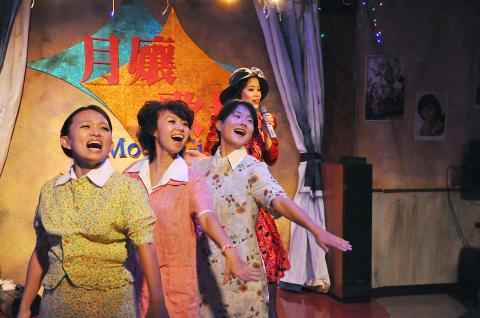When Slow Island Theater Group’s (慢島劇團) popular musical, Moon Girl (月孃), premiered in 2010, their choice of venue seemed unconventional at first. For two weeks, the troupe performed a story about the lives of three women growing up together in a karaoke parlor in front of a live audience at Ke Lai (閣徠演歌坊), a karaoke parlor in Taipei’s Ningxia Night Market (寧夏夜市).
“Every performance, there would be two, three people in the audience who hadn’t seen any theatrical production before. They came to sing karaoke, but found us instead,” troupe founder Wang Ke-yao (王珂瑤) says.
It’s precisely these types of audiences that the theater troupe wants to reach out to — people who don’t normally go to the theater.

Photo Courtesy of Slow Island Theater Group
For its 2013 production, Factory (鐵工廠), Slow Island teamed up with organizations such as the Taiwan International Workers Association (台灣國際勞工協會) to invite factory employees, migrant workers and immigrants from Southeast Asian countries to see a lively musical centering on a group of Thai, Indonesian and Taiwanese workers at a small factory in Greater Taoyuan. It used dance, singing and comedy to address social issues surrounding labor and immigrant workers.
BRINGING THEATER TO THE MASSES
To Wang, the aim is to create everyday art for everyday folk. “My performances used to be poetic and abstruse. Every time my mom came to my show, she would be like, ‘I don’t understand a thing,’” she says.
In 2008, Wang returned to her hometown in Taoyuan and established Slow Island. Often assuming the roles of both producer and performer, Wang collaborates with different artists, which explains the troupe’s diverse oeuvre. Factory was directed by Lin Hsin-i (林欣怡) from the more politically-oriented Taiwan Haibizi (台灣海筆子). Meanwhile, Mint, Rosemary and the Flower with no Name (薄荷、迷迭香和不知名的花) in 2008 and Awakening of Love (夢醒時分) in 2012 are romantic comedies led by Wu Shih-wei (吳世偉).
Moon Girl, on the other hand, is a collaboration between Taiwan’s theatrical talents, including Betsy Lan (藍貝芝) and Hung Pei-ching (洪珮菁) and American director Dan Chumley, with whom Wang had worked on a Taiwanese production of The Vagina Monologues (陰道獨白) in 2007.
Featuring many old Mandarin and Hoklo-langague ballads as well as original songs by Cheng Chieh-jen (鄭捷任), the music director of Tiehua Music Village (鐵花村) in Taitung County, the production tells a bittersweet story about the decline of a karaoke parlor called Moon Girl. It revolves around three orphaned girls who were raised by the parlor owner who go their separate ways after growing up and return bearing the scars of life.
Since its successful premiere, Moon Girl has returned to few karaoke parlors and other venues in Taitung County, Greater Tainan and Greater Taoyuan’s Jhongli District (中壢) in 2012. It even traveled to Brazil last year. A new tour began in Greater Kaohsiung last month and will end this week with six shows in Yilan City.
“It is a melodrama. It is about humanity. Everybody can understand it,” Wang adds.
When asked about what she wants to do next, Wang says she has planned to bring an audience-friendly production of Shakespeare’s A Midsummer Night’s Dream to local parks and community centers across the country.
“I think stage performances are good to see. People just don’t know how and where to see them. Hopefully, I can offer more access,” Wang says.

May 11 to May 18 The original Taichung Railway Station was long thought to have been completely razed. Opening on May 15, 1905, the one-story wooden structure soon outgrew its purpose and was replaced in 1917 by a grandiose, Western-style station. During construction on the third-generation station in 2017, workers discovered the service pit for the original station’s locomotive depot. A year later, a small wooden building on site was determined by historians to be the first stationmaster’s office, built around 1908. With these findings, the Taichung Railway Station Cultural Park now boasts that it has

Wooden houses wedged between concrete, crumbling brick facades with roofs gaping to the sky, and tiled art deco buildings down narrow alleyways: Taichung Central District’s (中區) aging architecture reveals both the allure and reality of the old downtown. From Indigenous settlement to capital under Qing Dynasty rule through to Japanese colonization, Taichung’s Central District holds a long and layered history. The bygone beauty of its streets once earned it the nickname “Little Kyoto.” Since the late eighties, however, the shifting of economic and government centers westward signaled a gradual decline in the area’s evolving fortunes. With the regeneration of the once

The latest Formosa poll released at the end of last month shows confidence in President William Lai (賴清德) plunged 8.1 percent, while satisfaction with the Lai administration fared worse with a drop of 8.5 percent. Those lacking confidence in Lai jumped by 6 percent and dissatisfaction in his administration spiked up 6.7 percent. Confidence in Lai is still strong at 48.6 percent, compared to 43 percent lacking confidence — but this is his worst result overall since he took office. For the first time, dissatisfaction with his administration surpassed satisfaction, 47.3 to 47.1 percent. Though statistically a tie, for most

In February of this year the Taipei Times reported on the visit of Lienchiang County Commissioner Wang Chung-ming (王忠銘) of the Chinese Nationalist Party (KMT) and a delegation to a lantern festival in Fuzhou’s Mawei District in Fujian Province. “Today, Mawei and Matsu jointly marked the lantern festival,” Wang was quoted as saying, adding that both sides “being of one people,” is a cause for joy. Wang was passing around a common claim of officials of the People’s Republic of China (PRC) and the PRC’s allies and supporters in Taiwan — KMT and the Taiwan People’s Party — and elsewhere: Taiwan and